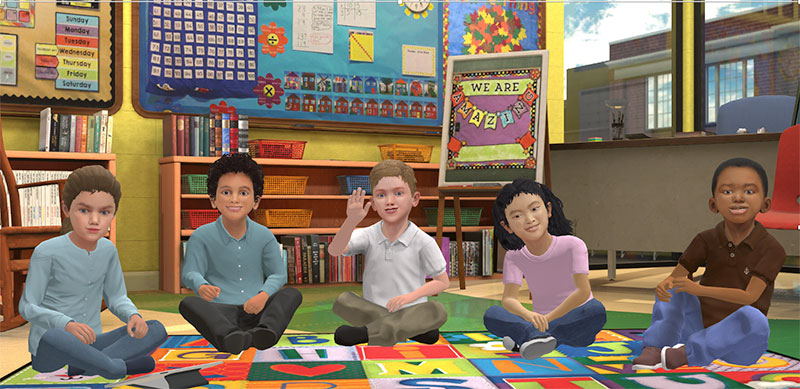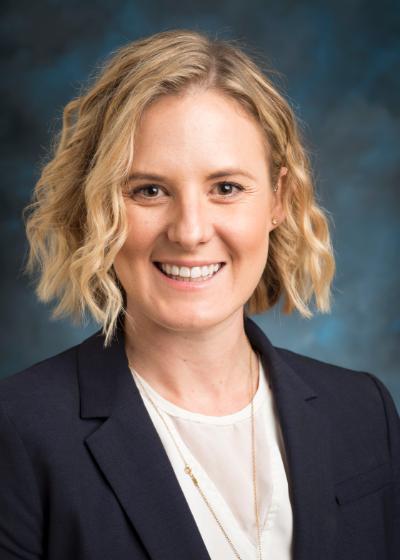
Image Copyright 2021 by Mursion, Inc.
When Julia Jackson B.A. ’21, M.A. ’22 met her elementary students on the first day of school, it didn’t go as smoothly as she might have hoped.
“I introduced myself as Miss Jackson, and right away one of them said, ‘Oh, you mean like Janet Jackson? Can you sing?,’ and suddenly they were off on all these tangents,” Jackson recalls. On another day, as she began a new science lesson, a student interrupted to declare, ‘Miss Jackson, I really don’t like science.’”
To any classroom teacher, the experience of students throwing a wrench into their best-laid plans is all too familiar. But in Jackson’s case, the students weren’t real kids—and if she got flustered or wanted a do-over after her initial response, Jackson could pause mid-lesson to strategize with her instructor and peers on the best way to move forward.
For the 2021-22 academic year, LMU School of Education students have begun using Mixed Reality Simulation (MRS), a technology that allows them to rehearse their skills by immersing them in virtual educational environments featuring life-like avatars of students, principals, parents, and teachers. Through simulated lessons, classroom experiences, leadership scenarios, and counseling what-ifs, future educators can hone their expertise and receive real-time feedback designed to strengthen and deepen their practice.

“Although there is a strong academic component to preparing educators, this is also a very practical profession, and it’s hard to reproduce the classroom setting in an authentic way so that our candidates can rehearse outside of their clinical practice,” says Ashley Ireland, curriculum and professional learning developer for SOE’s Innovation in Digital Education and Leadership (iDEAL) Institute and head of the MRS initiative. “This gives them opportunities to practice in a setting that doesn’t affect real students, with professors and peers there to talk it through.”
LMU SOE is an early adopter of MRS and has expanded its use beyond future teachers. As of 2020, Ireland notes, less than four percent of teacher preparation programs in the U.S. were using it; this year, SOE is implementing MRS for candidates across a wide range of its programs, including teacher preparation, school counseling and psychology, and educational leadership. The school is licensing the technology from SIMPACT, a program at California State University, Northridge (CSUN).
In the simulations, while SOE’s candidates interact with avatars acting as students or other stakeholders on the screen, MRS allows for a so-called human-in-the-loop facilitator who controls the avatars. Thus, as facilitator, Ireland can challenge SOE’s candidates to react to various common scenarios, such as how to respond when a parent says, “You’re wrong” about a teacher’s assessment of their child. Candidates can pause the simulation to discuss the optimal handling of a difficult encounter with their instructor and peers at any time, and they can also watch a recording of their interactions and obtain feedback that helps them improve and refine their methods.
Jackson, currently a student teacher in a third-grade classroom in the Los Angeles Unified School District, says she and her peers in the MRS class were initially taken aback by how real the simulations felt. “LMU is really good at preparing us for the foundations of teaching, like how to develop and follow through with lesson plans,” Jackson says. “But what you can’t really learn through courses is what to do when you have this awesome lesson plan and all of a sudden the kids are talking about their cats for 10 minutes. That’s where MRS is really helpful.”
Ireland brings considerable experience and expertise on the use of MRS in preparing educators. As a professional learning developer for Alexandria City Public Schools in Alexandria, Virginia, she served as director of the first public school system to incorporate the technology, and this year she completed her doctoral dissertation on the topic. After joining the SOE faculty in 2017, Ireland initiated a pilot program that integrated MRS into a handful of courses; under her direction, SOE expanded the program nearly tenfold beginning this fall.
She expects more schools of education to adopt MRS in the future, as large-scale studies have shown that just four 10-minute simulation sessions can impact a teacher’s practice. “MRS won’t replace clinical practice for teachers,” Ireland says, “but it can support it by providing a safe environment for targeted practice of the skills they need.”